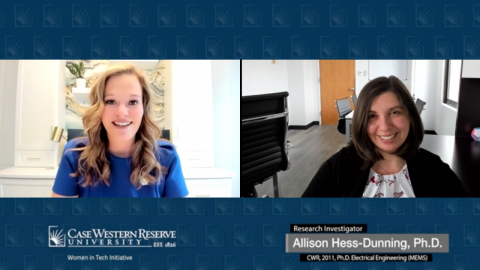On behalf of Case Western Reserve University’s Women in Tech Initiative, Michelle Burgess interviews Allison Hess-Dunning, Ph.D., research investigator with APT Center and the Louis Stokes Cleveland VA Medical Center. Learn more about her exciting work and the path she took to get to her role.
Tell us about your pathway to a Ph.D. in electrical engineering from CWRU and the Louis Stokes Cleveland VA Medical Center.
Allison Hess-Dunning: I did my undergrad at the University of Pittsburgh, where I majored in Engineering Physics. That major is made up of physics, electrical engineering and material science courses. It was a small program, but it was a good match for me because I had some vague interests in advanced materials and electronics. I also had some summer internships that helped solidify my interest in pursuing graduate studies in flexible microsystems. That led me to working under Professor Chris Zorman in electrical engineering at CWRU while I pursued my master's and Ph.D. degrees. The focus of that research was on the development of fabrication processes for devices that interface electronics with the nervous system.
Which aspects of your work bring you the most joy?
AHD: I enjoy playing with new toys and materials in the lab, but really the most joy comes from overcoming difficult problems with other people who are also trying to solve the same problems. It’s really gratifying when we finally get there. Also, as I work with more undergrads and graduate students, I really derive joy from seeing their progress and their successes. And I take a lot of pride in the idea that the work I'm doing is going to benefit veterans and others in their day-to-day activities.
What are some of the unique challenges that people might not know about with your line of work?
AHD: A primary challenge is certainly acquiring funding for a project. Our supplies, tools, equipment, as well as salaries for personnel and myself, all require funding. Funding is usually acquired through competitive grant proposal processes where you need to convince a panel, usually through a written document, that your proposed work is worth investing in. Funding agencies are limited as far as how much money they can distribute, which means that many ideas go unfunded. There are parallels with having a business. On the plus side, this mode of operation offers a lot of freedom in terms of determining the types of projects I work on.
If you had the chance to go back to school, what classes would you take now?
AHD: It would be a lot of fun to be able to go back. There are a lot of classes that I wish I would've taken, but not at the expense of classes that I did take. I'd like to take more non-engineering classes in areas like history that I have a better appreciation for now than I did back then. I'd also like to take some neuroscience classes. That's something that would be really interesting to me now that I didn't consider at the time.
Also, I'm not sure that these types of classes were available when I was an undergrad, but the research and project-based classes that are available at CWRU, where students learn by doing, are a great way to integrate knowledge and see how to apply it in education.
With your role at the Cleveland VA, you're still engaged at CWRU. Tell us what that relationship looks like.
AHD: I have two roles at CWRU. One is that I use the facilities to perform VA research. The work is funded by the VA, but there are some specialized facilities that it doesn't make sense to duplicate at the VA, so we use the facilities at CWRU, such as the fabrication facilities. Additionally, I started teaching a couple of courses in the electrical computer and systems engineering department. Those classes focus on the technologies required to build computer chips and various types of microscale sensors and systems.
What advice do you have for students interested in pursuing a similar career to yours?
AHD: Talk to as many people you can about their careers and why they chose them, and don't ever use your degree as a barrier or a limitation as to what you can learn. Don't be afraid of a topic just because you didn't take a class about it when you were an undergrad. Hopefully, what you've been taught is how to learn. You should take ownership of your knowledge and your understanding.
Additionally, something that surprised me about research and the real world in general is the importance of skills that aren't directly related to math and science comprehension. Communication is probably the most important skillset that you can work on. And it takes a lot of forms: writing, illustrations, and speaking. Communication is something I've worked on quite a bit throughout my graduate and postgraduate career, and I continue to work on it now.


